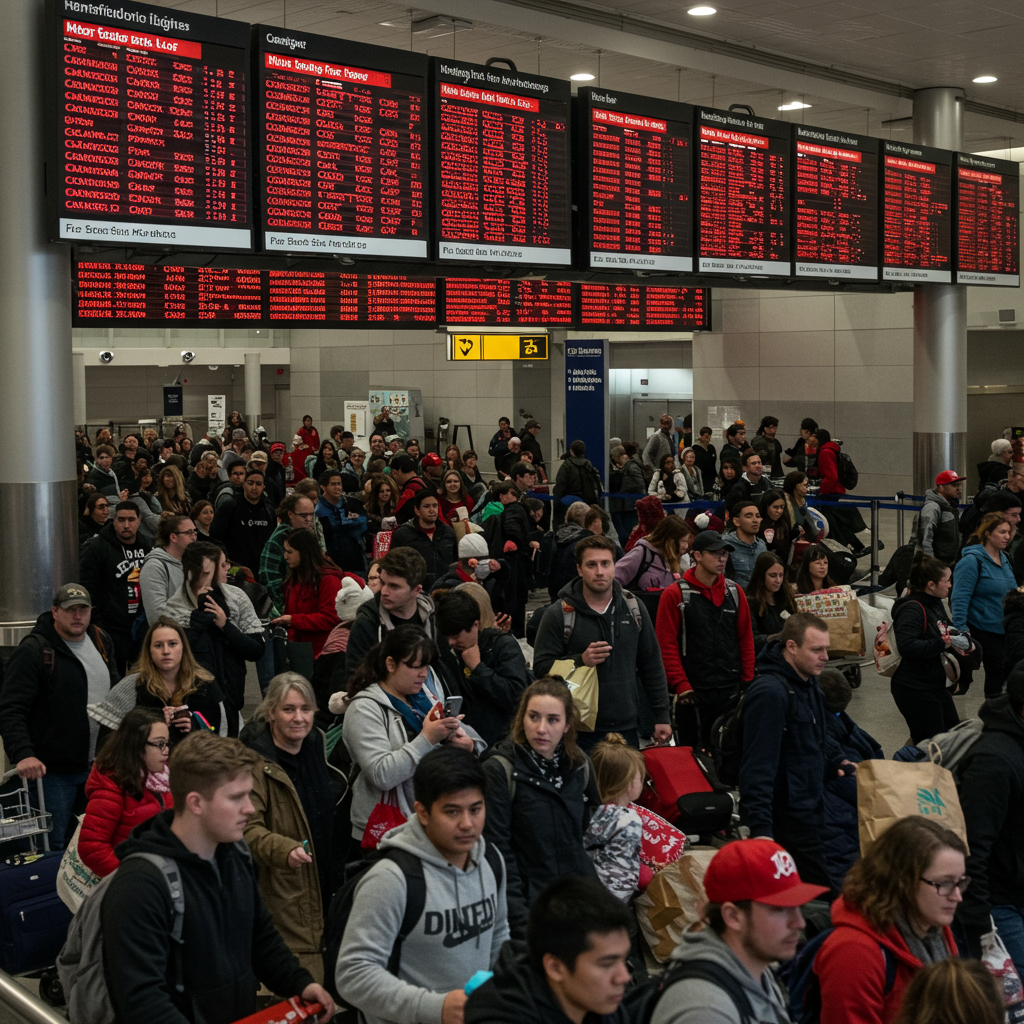severe weather unleashed significant disruption at Hartsfield-Jackson Atlanta International Airport (ATL) just as millions began their Fourth of July holiday travel. Powerful storms sweeping through the Atlanta area overnight Friday led to mass flight cancellations and delays. This critical disruption hit the world’s busiest airport at one of the busiest times of the year, leaving countless travelers facing uncertainty. As airport and airline crews work to restore normal operations, the impact is expected to ripple through the weekend.
Severe Weather Unleashes Havoc at World’s Busiest Airport
Friday night’s intense thunderstorms severely impacted operations at Atlanta’s Hartsfield-Jackson International Airport. Lightning strikes were reported near the facility. Powerful winds accompanying the storms were strong enough to necessitate the temporary evacuation of most air traffic controllers from the airport’s control tower, according to the Federal Aviation Administration (FAA). A small “skeleton crew” remained to manage essential tasks like handling inbound aircraft. While the main team later returned, this pause significantly complicated managing the high volume of holiday traffic.
Additionally, the storm system brought quarter-inch hail to the region. This hailstorm caused damage to multiple aircraft parked on the ground. Delta Air Lines, which operates its largest hub from Atlanta, reported that over 100 of its aircraft required inspection following the weather event. These crucial safety checks took place throughout Saturday morning, further delaying the return of these planes to service.
The combination of tower disruption, necessary aircraft inspections, and general severe weather conditions created significant operational challenges. An hour-long ground stop was also implemented Friday evening, preventing aircraft from taking off. While an airport spokesperson initially stated this had “no impact,” the preceding and subsequent issues clearly led to widespread disruption.
Delta’s Operations Bear the Brunt of Cancellations
As the dominant airline at the Atlanta hub, Delta Air Lines experienced the most significant impact from the storm’s fallout. According to data tracked by FlightAware early Saturday afternoon, Delta saw approximately 14% of its total flights canceled system-wide. This translated to hundreds of flights into and out of Atlanta being scrubbed. FlightAware data indicated that as of early Saturday, over 450 total flights at Hartsfield-Jackson had been canceled, with hundreds more facing delays. The vast majority of these were Delta flights.
Delta acknowledged the severe disruption caused by the weather. In a statement, the airline confirmed they were “working to safely restore operations and assist customers impacted by the severe storms at our Atlanta hub Friday night.” The airline’s Chief Customer Experience Officer issued an apology for the inconvenience and uncertainty travelers were facing. Recovering from an event impacting over 100 aircraft and disrupting operations at a major hub requires significant logistical effort.
Holiday Travel Rush Collides with Storms
The severe weather could not have hit at a worse time. The incidents at Hartsfield-Jackson occurred right as the busy Fourth of July holiday travel period began. AAA estimated that a staggering 72.2 million Americans planned to travel 50 miles or more from home during the holiday period, which spans from Saturday, June 28, through Sunday, July 6. Of those millions, a significant portion – 5.84 million travelers – were expected to fly to their destinations.
Atlanta’s Hartsfield-Jackson is the world’s busiest airport, serving over 100 million passengers annually. Airport officials anticipated particularly heavy traffic volumes during the holiday rush. They projected nearly 400,000 passengers would pass through the airport on Friday alone, the day the storms hit. Over the entire holiday period, more than 4 million passengers were expected. The convergence of this peak travel demand with severe operational constraints created a perfect storm for widespread traveler frustration and delays.
Lingering Impact and What Travelers Should Know
The effects of Friday night’s storms extended well beyond the initial event. Delta anticipated “continued disruption” throughout the weekend. They stated that several hundred more cancellations were expected as they worked through the complex process of recovering their schedule, repositioning aircraft, and getting their operations back on track safely and quickly. The airport itself posted on X, confirming that “severe weather overnight is causing delays and cancellations.”
Severe weather events like the one in Atlanta frequently cause cascading effects across the entire air travel network. Major hubs are particularly vulnerable because disruptions there impact flights arriving from and departing to numerous destinations. This can lead to delays and cancellations far beyond the immediate storm zone. Airlines typically issue travel waivers during such widespread events, allowing passengers to rebook without penalty. Delta advised passengers to use the Fly Delta app for the most current updates on their specific flights. They also indicated they were offering reimbursement for costs incurred for hotels, food, or alternate transportation due to the weather-related disruptions.
It’s important for travelers to understand the difference between weather-related disruptions and those controllable by the airline. While airlines must refund the unused portion of a ticket if a flight is canceled or significantly delayed due to weather and the passenger chooses not to travel, compensation for meals or hotels is generally not required for weather delays. However, airlines sometimes offer assistance voluntarily, as Delta indicated in this instance. Travel insurance or benefits provided by credit cards used for booking can be valuable resources for recouping unexpected expenses during weather-induced travel interruptions.
Navigating Future Weather Delays: Insights for Air Travelers
Air travel networks are inherently susceptible to severe weather. From winter storms grounding flights in the Midwest to summer thunderstorms disrupting operations at major southern hubs like Atlanta, these events are a regular challenge. Past severe weather episodes, including winter storms impacting multiple US hubs, have shown how quickly cancellations and delays can escalate into the thousands system-wide, affecting major carriers like Delta and others. Such events highlight the importance of preparation and flexibility when flying, especially during peak travel seasons.
Monitor Conditions: Stay informed about weather forecasts at both your departure and arrival airports.
Check Flight Status Regularly: Use airline apps, airport websites, or third-party flight trackers for real-time updates.
Be Proactive: If severe weather is predicted, check if your airline has issued a travel waiver that allows you to change your flight for free.
Know Your Rights: Familiarize yourself with airline policies and U.S. Department of Transportation rules regarding delays and cancellations, particularly the distinction between weather and controllable issues.
- Consider Travel Insurance: Especially during volatile weather seasons or for critical trips, travel insurance can help cover unexpected costs like accommodation and meals during delays.
- keyt.com
- www.yahoo.com
- www.atlantanewsfirst.com
- thepointsguy.com
- www.yahoo.com
Understanding the potential for disruption, especially during peak travel times at major hubs like Atlanta, empowers travelers to make more informed decisions and better navigate the challenges posed by severe weather.
Frequently Asked Questions
Why did severe weather cause so many cancellations at Atlanta’s airport?
Severe weather on Friday night included powerful winds, lightning, and hail. The high winds forced the evacuation of most air traffic controllers from the tower, complicating flight management. Quarter-inch hail damaged over 100 Delta aircraft, requiring extensive inspections before they could fly again. A temporary ground stop also halted departures. These factors, combined with the airport’s high volume of traffic, especially during the holiday rush, overloaded the system and led to widespread cancellations and delays.
Where can travelers get the latest updates on Atlanta airport flights?
The most reliable sources for current flight status are the airline’s official communication channels. For Delta passengers, the Fly Delta app is recommended for real-time updates. Travelers flying other airlines should check their specific airline’s website or app. General information about delays and cancellations at Hartsfield-Jackson Atlanta International Airport can also be found on the airport’s official website or its social media accounts (like their post on X mentioned in the article).
What should I do if my flight is canceled due to weather at ATL?
First, check your airline’s app or website for information on rebooking options. Airlines typically rebook you on the next available flight, but you may be able to change to an earlier or later date, especially if a weather waiver is in effect. If you choose not to travel due to a significant weather delay or cancellation, you are entitled to a refund for the unused portion of your ticket. While airlines are not usually required to cover hotels or meals for weather delays, Delta indicated they were offering reimbursement in this specific instance. Travel insurance or credit card benefits might also provide coverage for unexpected expenses.
Severe weather remains a significant challenge for air travel, particularly at major hubs like Atlanta during peak seasons. The events at Hartsfield-Jackson highlight the vulnerability of even the world’s busiest airports to the power of nature. As recovery efforts continue through the weekend, travelers are urged to stay informed and patient. Understanding the reasons behind the disruptions and knowing how to access information and utilize available resources can help mitigate the stress of travel during such challenging circumstances.
Word Count Check: 1048



